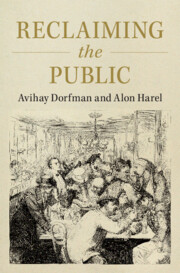Book contents
- Reclaiming the Public
- Reclaiming the Public
- Copyright page
- Dedication
- Contents
- Acknowledgments
- Introduction
- 1 A Public Conception of Political Authority
- 2 Law as Standing
- 3 Speaking in a Different Voice
- 4 Inherently Public Goods
- 5 Against Privatization as Such
- 6 Public Ownership
- 7 Why Not Artificial Intelligence?
- Concluding Remarks
- Index
6 - Public Ownership
Published online by Cambridge University Press: 22 February 2024
- Reclaiming the Public
- Reclaiming the Public
- Copyright page
- Dedication
- Contents
- Acknowledgments
- Introduction
- 1 A Public Conception of Political Authority
- 2 Law as Standing
- 3 Speaking in a Different Voice
- 4 Inherently Public Goods
- 5 Against Privatization as Such
- 6 Public Ownership
- 7 Why Not Artificial Intelligence?
- Concluding Remarks
- Index
Summary
This chapter addresses the questions of what public property is and why it matters. The key to defending public property lies in disambiguating the sense in which this system of rights with respect to external resources is public and, ultimately, about our property. Public property can be said to be ours in the sense that we can freely use it. On this view, held by lawyer economists, democratic egalitarians, and some Kantians, public property is akin to easement rights to enter and use a resource without the leave of its owner. The chapter criticizes proponents of the easement conception, arguing that they cannot but fail to explain why the “publicness” of the resource matters. It demonstrates that easement-like rights are fully consistent with a system of private property.
Instead, the chapter argues that public property’s distinctive value lies in control, rather than use, rights. Public property is ours in the sense that we are entitled to control it. That is, it extends autonomous agency to the construction of public spaces and resources. Public property places individuals in a position of collective self-government, manifested in the following two particular ways: First, expressing the ideas and commitments that the political community as a whole affirms; and second, exerting control over the construction and direction of the resources that make up the environment the individuals occupy.
- Type
- Chapter
- Information
- Reclaiming the Public , pp. 149 - 170Publisher: Cambridge University PressPrint publication year: 2024

